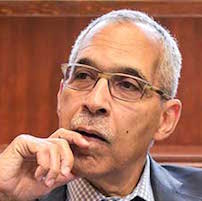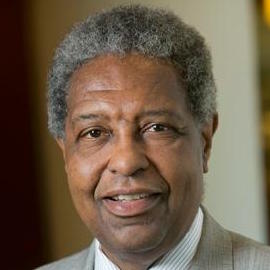 Claude Steele, professor emeritus in the social sciences at Stanford University pioneered the concept of stereotype vulnerability. Professor Steele and his colleagues conducted a number of experiments when subjects performing challenging tasks are aware that their ability is being gauged by their race are generally thought to perform poorly, they feel anxious about confirming or being judged by the stereotype, and their anxiety interferes with their performance. Professor Steele wrote a book on the subject: Whistling Vivaldi: How Stereotypes Affect Us and What We Can Do (W.W. Norton, 2010).
Claude Steele, professor emeritus in the social sciences at Stanford University pioneered the concept of stereotype vulnerability. Professor Steele and his colleagues conducted a number of experiments when subjects performing challenging tasks are aware that their ability is being gauged by their race are generally thought to perform poorly, they feel anxious about confirming or being judged by the stereotype, and their anxiety interferes with their performance. Professor Steele wrote a book on the subject: Whistling Vivaldi: How Stereotypes Affect Us and What We Can Do (W.W. Norton, 2010).
Previous studies have found the prejudice that Black people are less intelligent than White people can have detrimental effects on the performance of Black subjects. When reminded of their racial identity before taking a test – and put under the lens of this negative stereotype – Black students have significantly higher blood pressure rates, are more cognizant of their racial identity, and perform worse on the test when it is framed as a measure of intelligence.
 But a new study co-authored by William A. “Sandy” Darity Jr., a professor of public policy and economics at Duke University, found that threat to have no effect on a previously underexamined cohort: HBCU students.
But a new study co-authored by William A. “Sandy” Darity Jr., a professor of public policy and economics at Duke University, found that threat to have no effect on a previously underexamined cohort: HBCU students.
Conducting their research at an HBCU in Texas, the authors asked students to answer a set of 18 verbal Graduate Record Examinations questions. Those in the treatment group were asked about their race or ethnicity prior to taking the test, and they were told the test was a measure of their intelligence. Contrary to the findings in the prior experiments, the authors found no significant difference in the number of questions answered correctly by the subjects in the control and treatment groups – that is, the students who weren’t reminded of their race and those who were reminded performed equally well on the test.
One explanation for these findings, according to the authors is the unique environment that HBCUs provide for students. Evidence suggests both diverse faculty and greater exposure to success of individuals in one’s identity group — two distinguishing characteristics of the HBCU experience — help diminish the deleterious effects of stereotype threat.
The full study, “The Effect of Stereotypes on Black College Test Scores at a Historically Black University, was published in the Journal of Economic Behavior and Organization. It may be accessed here.

